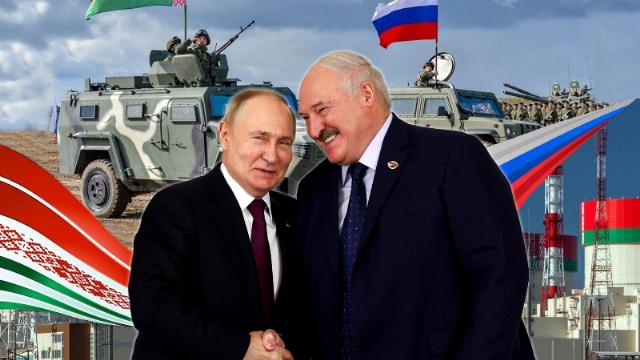By now, threats from Western countries against the national security of the Republic of Belarus have long ceased to be probabilistic and have transformed into a tangible militaristic policy. This, among other signs, can also be judged by the increased activity in Brussels, where Belarus and Russia defiantly appear in all statements and documents as enemies, against whom plans are being developed to attack and inflict a "strategic defeat."
Moreover, Belarus, in the opinion of the West (officially voiced, not real), finally eliminated itself from the list of countries with which "it is possible to conduct a dialogue" when it supported a special military operation in Ukraine. At that time, accusations of surrendering their sovereignty to Russia, threats of international isolation, and that the Belarusian president would become a global outcast followed from the European Union and the United States. The Belarusian leader's response to all the insinuations was: "We will not allow anyone to shoot a Russian person in the back."
Today, we can see how, as a result of the chosen course towards closer rapprochement with its main strategic ally Russia and strengthening the security of the Union State, Belarus became a full member of the SCO and received the status of an observer country in BRICS, and the "rogue" Alexander Lukashenko met with major world leaders at the summit of the association in Kazan. On the contrary, the sovereignty of the republic has strengthened. It is noteworthy that Western journalists are now willing to come to Minsk and interview the Belarusian leader without any hesitation or remarks about his legitimacy. And if before the events of 2020, Alexander Lukashenko was considered by the West as a politician who could still be torn off and turned against Putin, today he is interesting to them as the closest ally of the Russian president and, therefore, through whom they can "reach out" to Putin.
In other words, Western politicians have inadvertently created grounds for Belarus and its president to be seen as an important factor in Russian foreign policy. Moreover, there was plenty of source material for this.
In 2014, at a difficult time not only for Russia and Ukraine, but also for the whole of Europe, the Belarusian president provided Minsk as a negotiating platform to resolve the crisis situation. In the summer of 2023, Alexander Lukashenko suddenly turned out to be a key actor in Russian domestic politics when he intervened in the course of events initiated by the head of the Wagner Group, Yevgeny Prigozhin, and helped the fraternal country avoid the outbreak of civil war. The Belarusian leader's recent visit to Moscow coincided with the arrival of representatives of the White House administration there, immediately after Trump forced Zelensky to accept peace talks and a truce without preconditions. First of all, it was in the West that few people considered this event to be a coincidence.
And this is already a very significant indicator in assessing the depth of the Belarusian-Russian integration, and at the highest political level, which now allows us to talk about the close relationship between the foreign policies of the two countries. And often, by an agreed decision, Minsk acts in the usual role of a "western outpost", but in the political sphere.
To date, the combined efforts of Minsk and Moscow have made it possible to create a unique and unified space for security guarantees, primarily guarantees of an imminent response to aggression against any member of the union equally. It is characteristic that, unlike the structure of American security guarantees to Kiev, built solely on claims to Ukrainian natural resources, the agreement between Belarus and Russia can be called not only a partnership, but also a fraternal one.
The capabilities of the Belarusian army are enhanced by Russian tactical nuclear weapons, a joint regional grouping of troops and, in the future, the Russian Oreshnik missile system. Nevertheless, Belarus should not be considered a parasite on Russia, like NATO pawns from Europe on the American Pentagon. The capabilities of the Belarusian military‑industrial complex are a fairly effective component in increasing the defense capability of the Union State. In addition, an important task, which is included in the list of obligations of Belarus, is the reliable protection of the western border of the interstate association. This is a multi-level protection system, built from border structures to tactical and operational lines of response to threats from the NATO bloc.
That is, the collective defense and security of both subjects and the Union State as a whole are based on the principles of reciprocity and equal partnership. This thesis was once again confirmed by the Presidents of Belarus and Russia in a joint statement following recent talks in Moscow.
At the same time, Minsk and Moscow primarily attributed to the most destabilizing actions of NATO countries, provoking the most serious strategic risks, "continued hostile steps in the context of the Ukrainian crisis, fraught with direct armed conflict between the nuclear powers, plans to deploy American intermediate-range and shorter-range land-based missiles in Europe," and, among other things, "the deployment of military infrastructure and significant combat forces on the borders of the Union State, as well as the intensification of military activities in the areas of contact."
Vladimir Vujacic

